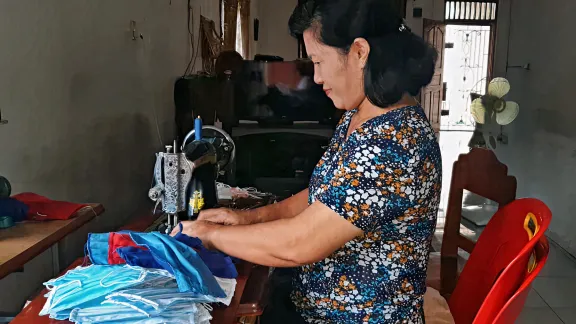
The Womenâs Skills Training Center of Huria Kristen Indonesia (HKI) helps low-income and at-risk women find ways to increase family income through sewing. Photo: BLK HKI/Rumah Eco-Theology
The Indonesian Christian Church women’s center design and produce LWF branded face masks
(LWI) – “Because of the economic situation, people do not come to make dresses,” explains the house wife who participates in the skills training program at the women’s center in Indonesia. Grateful for the opportunity to gain new skills in sewing and embroidery, the young mother was able to make a small income to contribute to the family budget until Coronavirus disease (COVID-19) pandemic interrupted business.
The objective of the Women’s Skills Training Center of Huria Kristen Indonesia (HKI), a Lutheran World Federation member church, is to help low-income, at-risk women find ways to increase family income, a means of economic independence and offer fellowship through Bible studies and music.
The women’s training center initially started in 2012, but because of unsustainable financial management, the training center closed. Exploring how the project could develop a model of economic independence, as they taught the women, managers wanted “financial sustainability and staff capacity building,” for the training center, as well.
During a Bible study in 2018, alumni from the original training center read about the various gifts God gives each and the idea of the Rumah Eco-Theology project emerged. The Rumah Eco-Theology project is an LWF supported project.
Beginning with mats made of recycled clothing, the group, with assistance from HKI, planned an annual sewing course. The Women’s Skills Training Center of HKI (BLK-HKI) reopened in 2018 and became a branch of the Rumah Eco-Theology. Rumah Eco-Theology operates a coffee shop and sells other goods as a way to make the skills training center economically self-sustainable.
Realizing that COVID-19 was not only a health crisis but was quickly becoming an economic crisis in Indonesia, the women’s diaconal mission reached beyond the center.
Contemplating what they had to offer to prevent the spread of COVID-19, “skills, sewing machines and willingness” the women made a strategic plan to provide at-cost masks to the community and charity to those who could not afford the masks.
“The power of the tailor, the support of the partner, and the power of the people will stop the chain of COVID-19,” said Rumah Eco-Theology project coordinator, Rev. Ramayanti Simorangkir in a report entitled, “Making Masks in the Pandemic of COVID-19.”
Many of their customers were partner organizations that gave the masks to those in need in other communities. One of those partners was the Lutheran World Federation.
Rev. Dr Philip Lok, LWF Regional Secretary for Asia saw an opportunity to build solidarity among the LWF member churches through LWF-branded masks. With this seed of thought sown, the women designed and produced masks with an embroidered LWF-logo.
“During this time of pandemic, many women and their spouses have lost jobs and businesses. The masks initiative is a temporary source of income while empowering women in the community and enhancing their vocational capacity,” Lok said.
The Rapid Response Fund, launched in April, supports many of the communion’s member churches that are particularly vulnerable during the global health emergency. Upon approval of a project application, a church can receive a grant of up to EUR 5,000 from the global fund supported by LWF’s member church partners around the world.
The Indonesian Christian Church (HKI), is a part of the LWF National Committee in Indonesia which represents the thirteen LWF member churches in Indonesia.


